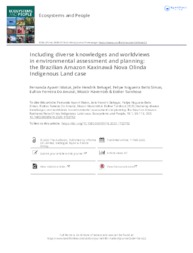Including diverse knowledges and worldviews in environmental assessment and planning: the Brazilian Amazon Kaxinawá Nova Olinda Indigenous Land case.
Including diverse knowledges and worldviews in environmental assessment and planning: the Brazilian Amazon Kaxinawá Nova Olinda Indigenous Land case.
Autoria: MATUK, F. A.; BEHAGEL, J. H.; SIMAS, F. N. B.; AMARAL, E. F. do; HAVERROTH, M.; TURNHOUT, E.
Resumo: The concepts of 'ecosystem services' (ES) and 'nature's contributions to people' (NCP) inform environmental frameworks that set out to include Indigenous and Local Knowledge systems (ILK) and worldviews in policy and planning processes. These frameworks aim to enhance biodiversity conservation and human well-being in a legitimate and effective way. In this article, we explore how the concept of People's Contributions to Nature (PCN) is complementary to NCP. We use it to investigate challenges that planners and locals face in realizing the legitimate inclusion of diverse knowledges and worldviwes that account for people and ecosystems in a relational way. We introduce a case study where planners drew on ES and NCP and used participatory methods to implement a REDD+ policy in the Kaxinawá Nova Olinda Indigenous Land (Acre-Brazil). We find that both Kaxinawás and planners emphasize both NCP and PCN in their discourses. Nevertheless, differences between knowledge systems and disciplines, uneven power relations between Kaxinawás and planners, and an underconsideration of PCN by global frameworks challenge the legitimate inclusion of the Kaxinawá knowlege and worldviews to craft assessment and planning. We conclude that by explicitly addressing these challenges, science-policy interfaces can further advance knowledge legitimacy and policy effectiveness.
Ano de publicação: 2020
Tipo de publicação: Artigo de periódico
Unidade: Embrapa Acre
Palavras-chave: Abordagem participativa, Acre, Amazonia Occidental, Amazônia Ocidental, Conhecimento tradicional, Conocimiento tradicional, Contribuições das pessoas para a natureza, Ecosystem services, Gestión participativa, Indigenous knowledge, Indigenous peoples, Participatory management, People's contributions to nature (PCN), Povos indígenas, Pueblos indígenas, Servicios ecosistémicos, Serviços ecossistêmicos, Terra Indígena Kaxinawá de Nova Olinda (TIKNO), Western Amazon
Observações
1 - Por padrão são exibidas publicações dos últimos 20 anos. Para encontrar publicações mais antigas, configure o filtro ano de publicação, colocando o ano a partir do qual você deseja encontrar publicações. O filtro está na coluna da esquerda na busca acima.
2 - Para ler algumas publicações da Embrapa (apenas as que estão em formato ePub), é necessário ter, no celular ou computador, um desses softwares gratuitos. Sistemas Android: Google Play Livros; IOS: iBooks; Windows e Linux: software Calibre.
Acesse outras publicações
Acesse a Base de Dados da Pesquisa Agropecuária (BDPA) para consultar o acervo completo das bibliotecas da Embrapa.

